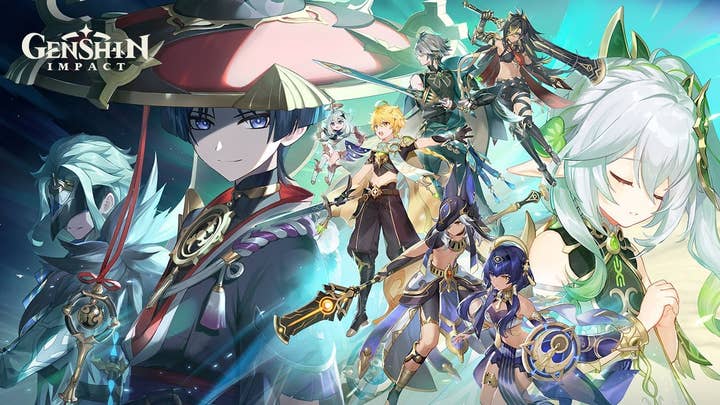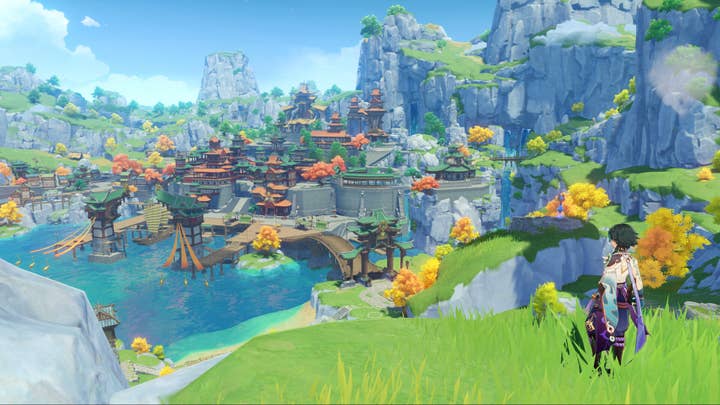Can Microsoft find its next big thing in China? | Opinion
Stung by failure to sign Genshin Impact, Microsoft turns to China as it works to build out the Xbox software pipeline – but is it just chasing after the one that got away?
The success of Xbox Series X/S has been an absolutely staggering turnaround for Microsoft's fortunes in the console market, putting the company back on something approaching an even footing with Sony despite the (largely self-inflicted) drubbing it suffered in the previous generation.
Nonetheless, when we discuss Microsoft's success in this generation there's always an elephant in the room, and every now and then, the elephant gets a little restless and a little harder to ignore. The Xbox Series consoles have fantastic hardware. Moreover, the company has gone back to its winning playbook from the Xbox 360 era with a brilliant services ecosystem. For all that, though, its software line-up remains weak – incredibly so, in fact, for a console that's approaching its second anniversary.
In the normal course of things, a console which failed to deliver a solid line-up of exclusive titles by its second birthday would be dead in the water, but we're not dealing with the normal course of things. Microsoft is maintaining consumer goodwill and enthusiasm on the back of a promise: that the games are coming, and while it may take a while, it'll be worth the wait.
In the normal course of things, a console which failed to deliver a solid line-up of exclusive titles by its second birthday would be dead in the water, but we're not dealing with the normal course of things
It's a promise with some weight behind it, in the form of the many billions of dollars the company has spent on acquiring publishers and building up a portfolio of first-party studios. We often talk about the ZeniMax/Bethesda acquisition in 2020, which was Microsoft's biggest gaming acquisition prior to the record-breaking bid to acquire Activision Blizzard King, but there was also a flurry of smaller acquisitions in the preceding years, which saw the company kickstart its first-party studio ambitions by picking up studios like Ninja Theory, Double Fine, Undead Labs, and Forza series developer Playground Games.
At some point, those acquisitions must bear fruit – nobody doubts that, even if Microsoft's chequered history of sitting down rather heavily on companies it acquires and then wondering why they're flattened has not gone unremarked. Nonetheless, the company's financial results this week drove home the point that the fruit hasn't been borne yet, with the Xbox numbers seeing a very unusual pair of trends for a console at this point in its lifecycle – hardware revenues up, software revenues down.
People are still keen to buy Xbox consoles, but they're buying fewer games for them. The new Xbox consoles are still, for now, in the weird and uncomfortable position of being unquestionably superb systems with widely praised services ecosystems and strong consumer demand and goodwill which simply don't have an exclusive software line-up worth a damn.
That the decline in software revenues in the quarter was a mere 3% is a testament to that service's ecosystem, and specifically how successful Game Pass has been. Microsoft lumps services and software revenues together in these numbers; growing Game Pass numbers are likely covering for a hell of a slide in more traditional software revenues.
Game Pass, and the enormous library of classic software from systems dating back as far as the original Xbox which it unlocks, is just one of the ways in which Microsoft has done an amazing job at positioning Xbox to succeed even despite the long wait for its software plans to come to fruition.
Nonetheless, as the third year of the console's lifespan looms, the company must be aware that it's on thin ice. Thus far, it has been sustained by an interlocking set of positive factors, such as high-profile acquisitions that have given weight to lavish promises of software just over the horizon, the hugely competitive pricing of Xbox Series S, and the good fortune to have had slightly less supply-side trouble than Sony has experienced in the past few years.
If the platform's software situation starts to look up within the next few quarters, it'll have made it to the edge of the ice unscathed – but conversely, a few significant software delays, or some major titles not meeting expectations, could see the ice start to crack.
People are still keen to buy Xbox consoles, but they're buying fewer games for them
That's no doubt part of the reason why Microsoft isn't resting on its laurels. Having sleepwalked into the prior generation in the apparent belief that a console platform holder barely needed game studios or exclusive IP at all, the company's Damascene conversion has led to it now frantically building out those resources, and even the enormous Activision Blizzard King acquisition isn't likely to be the end of that process.
Even as the weak software numbers in this quarter were being announced, reports emerged that the company is searching for promising new games and studios in China in particular. That's a clear sign that its ambitions for expansion go well past the completion of the ABK deal – and while the key competitor to Xbox right now is Sony (which, for all Microsoft's billions, still has a clear lead in terms of studios and IP), it's also looking ahead to the potential of competition from other major media and technology firms.
Gaining competitive advantage over Sony is only the first step; in the back of the company's executives' minds will be the question of how wide the moat will need to be to protect Xbox and Game Pass from potential competition from the likes of Netflix, Amazon, Disney, or any other giant that seeks to muscle into this space.
That's the long-term reason for aggressively seeking to sign games and studios in China for Xbox, and it's certainly smart. The short-term reason, though, is entirely reactive and arguably far less smart. Microsoft reportedly, and understandably, feels stung by its own failure to sign a deal for miHoYo's Genshin Impact – something which the company was reportedly close to securing at one point, but it withdrew, leaving Sony to build a relationship with the developer and effectively negotiate PlayStation exclusivity for a game that has gone on to gross billions of dollars in revenue, to the point where it is as important as the likes of Fortnite in certain markets and demographics.
Letting Genshin Impact slip through its fingers hurts, and it should hurt – it was a screw-up – but scouring China for the "next Genshin Impact" feels like a reactionary move that doesn't address the core problem of how to ensure Xbox doesn't miss out on the next Next Big Thing.

Remember when GTA 3 became a cultural phenomenon and most of the world's publishers spent the next decade trying to convince themselves that they'd come up with the next GTA, the "GTA-killer"? Or when World of Warcraft hit exactly the right cultural and technological moment with exactly the right game, and turned the MMORPG niche into a mainstream money-printing machine, leading to dozens of copycat MMOs which proved just as good at losing money as WoW was at making it?
The problem with these approaches is the same as the problem with hunting China for the next Genshin Impact: nobody could replicate the success of GTA, because GTA already existed. Nobody could copy the WoW formula with equal success, because they were launching into a world where WoW already existed. Similarly, Genshin Impact already exists, and the next game to achieve that kind of one-in-a-million success will come from a place that's equally unexpected and unpredictable.
There were signs, of course, that Genshin Impact had potential – the developer had a good track record, albeit not an enormously high-profile one, and the money being spent on Genshin Impact pre-launch was clearly going to result in a very polished and professional game, if nothing else. There were also warning signs which pointed in the other direction.
That pre-launch budget could be a millstone as much as a portent of success; the game needed to make back a $100 million development budget before getting into the black, and the developer was talking in terms of spending even more than that annually post-launch. Moreover, early impressions of the game – especially among western players – tended to ridicule its surface similarities to Breath of the Wild and dismiss it as an imitation of Nintendo's enormously successful game, which would likely have given potential suitors in western markets cold feet.
Game Pass, and [its] enormous library, is just one of the ways in which Microsoft has done an amazing job at positioning Xbox to succeed even despite the long wait for its software plans to come to fruition
All of those things and many others were bullets on a slide deck, neat argument points for and against Genshin Impact being a success. Looming on the negative side of the argument, of course, was the fact that its success would involve doing things that hadn't been done before – it was a big, risky investment on the notion of taking console/PC and mobile crossplay to a level well beyond what Fortnite had shown was possible, and on the even more risky and unprecedented idea of a Chinese developer making something that would be a phenomenal success in overseas markets, most notably around Asia but also in other territories.
There was no blueprint for this success to follow – which is precisely why it could be the Next Big Thing, because it had no predecessor that had already stamped its name on this market segment.
Figuring out whether a game like this, for which there's no precedent, is going to be a huge hit is hard – really, really hard. It involves looking at the game in depth, studying and analysing the audiences it is targeting, seeing the potential and the pitfalls, and weighing all of this based on incredibly deep market knowledge – and even after all that, the tie breaker comes down to a somewhat undefinable sense of taste and an instinct for what makes a game good. In this instance, Sony got those things right. Microsoft, as much as it undoubtedly has many people on board who have the required deep market understanding and good taste, did not.
These things happen; every creative industry, once it's had a few too many at an awards bash, starts telling stories of publishers and executives who missed out on signing The Beatles, or Star Wars, or Harry Potter, because they just couldn't see the potential. The real mistake is trying to make up for such an error by running around the same place waiting for lightning to strike a second time.
Figuring out whether a game like [Genshin Impact], for which there's no precedent, is going to be a huge hit is hard – really, really hard
This is not to say that it's a bad idea for Microsoft to sign games from China: geopolitical concerns aside, China is an important market and is home to a rapidly growing number of skilled development teams. Signing great games from China could absolutely help Microsoft to build out the Xbox software pipeline it so desperately needs. Focusing on that region because they missed the last big hit, though, doesn't make sense. If Microsoft wants to make sure it doesn't miss the next game to soar like Genshin Impact, its focus has to be on improving the company's own abilities to recognise, seize upon, and properly nurture these potential successes – not on some cargo-cult attempt to arrange things just like they were last time and wait hopefully for another multi-billion dollar hit to land.
The cruel irony, of course, is that when the games industry tells a story of "the one that got away" – the huge signing that a company passed over which could have changed industry history – it's Microsoft's story that always comes up.
Around the turn of the century, the company was given first refusal on making Grand Theft Auto 3 into an Xbox exclusive. It turned the game down. GTA 3 instead launched on the PS2, and the rest is history. Even once the franchise went fully multi-platform six years later with GTA 4 on PS3 and Xbox 360, it took many years for its association with PlayStation in consumers' minds to fade.
It's 20 years since that happened – but the lesson remains relevant. It's too late after the fact to say "we have to get one of those" and run around looking for a clone or imitation. The right response requires properly interrogating and changing the decision-making processes which led to missing out on signing the mega-hit – so the next time a game emerges from left-field and goes on to earn billions, they're on board from the beginning, not watching it disappear over the horizon.


